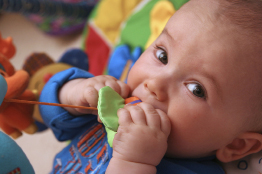Session 2
1. Session 2
1.1. Inquiry 1
Session 2: Intellectual Development
Inquiry 1: Intellectual Development and Piaget’s Theory
To provide you with an overview of the intellectual development of children between the ages of birth to six years, watch the video “Cognitive Development.”
Course Project
The video includes a lot of information about promoting children’s intellectual development. Look at the items and strategies you have made so far for your strategies box. Do any of these items and strategies also promote intellectual development?
Applying Piaget’s Theory
environment: all the different conditions and influences that affect the development of a child after birth
learning: a general term used to describe changes to someone’s behaviour because of what has been experienced
Consider the following information about intellectual development:
- Children’s experiences in the first six years of life have lifelong effects on intellectual ability.
- Every child has a different potential for intellectual ability.
- The ability of the child to reach his or her potential will depend on how the environment fosters and promotes intellectual development.
- Children’s intellect develops in predictable stages.
- Children progress through the stages at their own rates.
- Children view the world differently than adults as they progress through various stages of intellectual development.
- Every child has a preferred learning style.
Stages of Intellectual Development
Much of today’s understanding of intellectual development comes from the theories of Jean Piaget. While some of Piaget’s theories have been challenged or modified, the importance of his work in the area of early childhood intellectual development carries on. Two main lessons can be learned from the theories of Jean Piaget:
- Babies and young children think differently than adults and older children.
- You can encourage intellectual development, but you can’t “push” a child to think beyond the level of her or his development.
According to Piaget’s theory, children are in various stages at certain years of age.

© Clint Scholz/iStockphoto
Sensory Motor Stage
In the first two years of life, babies display the following intellectual development:
- Babies explore the immediate environment with their senses. They do not understand what is part of their body and what is part of the world around them. For example, babies of this age may hit their noses with their hands, but they will not understand that their hands are part of their bodies.
- Babies then begin to understand the difference between objects and their actions upon those objects. For example, babies in this stage might hit an object by accident, see it move, understand the connection, and then hit the object again to make it move.
- In the first year of life, babies don’t fully understand that an object exists when they cannot see the object.
Pre-Operational Stage

© Monika Adamczyk/iStockphoto
Between the ages of two and seven years, children display the following intellectual development:
- They understand that objects are permanent, and they begin to use language to label these concepts. They are now able to realize that a toy still exists even if they can’t see the toy.
- Toddlers have difficulty understanding other people’s perspectives. They think that everyone perceives the world as they do. This phase is referred to as egocentrism. This does not mean that they are selfish but, rather, that they are not able to understand the perspectives of others.
egocentrism: the inability to understand the perspectives of others
- As toddlers develop, they begin to learn to classify objects (e.g., the round ones and the blue ones), and they begin to form concepts (e.g., all big things are heavy).
- Children before the age of six can generally only reason in a simple, step-by-step way. They cannot reason “backward” or discover faults in reasoning.
- Children before the age of six generally believe what they see; they find it difficult to reason abstractly.
Why Is it Important to Understand Piaget’s Theory?
Piaget’s theory made the following clear:
- Preschool children need to learn by doing: interacting with the environment and touching, seeing, smelling, tasting, and hearing.
- Preschool children are not developmentally ready to understand another child’s point of view or the abstract value of sharing.
- Children need to be provided with many opportunities to learn through experimenting and playing with objects, but they cannot be forced to understand concepts before they are ready.
Course Completion Checklist
Have you remembered to update your Course Completion Checklist? If you haven’t already started to use the checklist, access it in the Toolkit now. Remember to update the Course Completion Checklist every time you work on the course.